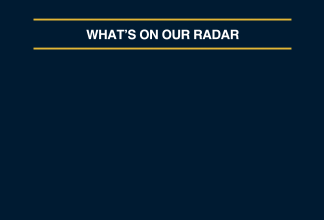How to Talk to Your Partner About Finances
Written by Tamar Satov
Published on February 12, 2020
minute read
Share:
Want to build a better relationship with your Valentine and improve your financial future? Put money talks on the agenda.
Couples who are on the same page about money are not only happier (indeed, research shows that financial disagreements are stronger predictors of divorce compared to other common disagreements), but can also work together to meet their goals. There's even some evidence that making joint decisions with a partner reduces financial risk.
Of course, broaching the topic of money with a loved one can be fraught with cringe-worthy moments and hurt feelings if you aren't careful. Here are some tips and guidelines for discussing money with a partner.
Pick your moment
Clearly, it's not wise to bring up a serious topic when you or your partner is feeling anxious, tired or stressed. So, if it's been a bad day at work or you got stuck in a brutal traffic jam, don't even think about bringing up money — even if you've scheduled a date that night specifically for this purpose. Better to postpone until you are both calm and clear-headed. Some couples find it beneficial to discuss matters while out for a walk, since the side-by-side dynamic is less confrontational than sitting across from each other. And no matter what, DO NOT choose Valentine's Day or other romantic evenings for a money talk — unless you want to get the cold shoulder.
Find conversation starters
There are often items in the news outlining Canadians' level of consumer debt, how much we are saving for retirement, current average home prices or stock market performance. You can easily transition into a personal discussion about money by citing something you've read. For example, you could say, "I just read something about retirement savings rates/consumer debt level for couples our age, and it made me wonder how we compare." If there's nothing appropriate in the news when you'd like to start your talk, feel free to cite this article instead, and how you learned that couples who discuss money are happier!
Express values and goals
What's important to you when it comes to money? For example, do you prefer to spend money on experiences like travel or dining out, or consumer items such as clothes and tech gadgets? If one of you is in the experiences camp and the other prefers tangible goods, there could be unspoken resentment about how the other spends money without this understanding. Similarly, talk about your long-term goals and dreams — including buying a house, having kids, retirement, etc. — and what your expected timelines are for them. Once you have identified shared goals, you can set up a plan to realize them.
Be open about income
It's easy to judge a partner for taking on debt or not saving enough, but have you ever talked about how much each of you earn? If your income is significantly higher and the two of you split expenses down the middle, your partner might need to go into debt just to keep up. A frank discussion about income — and coming up with a plan to be fair and equitable about expenses rather than equal — can go a long way toward achieving financial harmony.
Compare views about risk
Studies show women are generally more risk-averse than men, so you'll want to share your thoughts on the topic to gain a better understanding of your partner's motives. For example, if one of you highly values security and a steady income and the other is more entrepreneurial, that could breed some anxiety. In the same vein, investment choices are highly dependent on risk tolerance, so it's good to get your views on risk out in the open.
RBC Direct Investing Inc. and Royal Bank of Canada are separate corporate entities which are affiliated. RBC Direct Investing Inc. is a wholly owned subsidiary of Royal Bank of Canada and is a Member of the Investment Industry Regulatory Organization of Canada and the Canadian Investor Protection Fund. Royal Bank of Canada and certain of its issuers are related to RBC Direct Investing Inc. RBC Direct Investing Inc. does not provide investment advice or recommendations regarding the purchase or sale of any securities. Investors are responsible for their own investment decisions. RBC Direct Investing is a business name used by RBC Direct Investing Inc. ® / ™ Trademark(s) of Royal Bank of Canada. RBC and Royal Bank are registered trademarks of Royal Bank of Canada. Used under licence.
© Royal Bank of Canada 2023.
Any information, opinions or views provided in this document, including hyperlinks to the RBC Direct Investing Inc. website or the websites of its affiliates or third parties, are for your general information only, and are not intended to provide legal, investment, financial, accounting, tax or other professional advice. While information presented is believed to be factual and current, its accuracy is not guaranteed and it should not be regarded as a complete analysis of the subjects discussed. All expressions of opinion reflect the judgment of the author(s) as of the date of publication and are subject to change. No endorsement of any third parties or their advice, opinions, information, products or services is expressly given or implied by RBC Direct Investing Inc. or its affiliates. You should consult with your advisor before taking any action based upon the information contained in this document.
Furthermore, the products, services and securities referred to in this publication are only available in Canada and other jurisdictions where they may be legally offered for sale. If you are not currently a resident of Canada, you should not access the information available on the RBC Direct Investing Inc. website.
Explore More

Here’s What Every Canadian Should Know About Estate Planning
Insights from Leanne Kaufman to help you feel more confident as you plan
minute read

3 Things We're Watching This Week
What the Inspired Investor team is watching
minute read

What’s Driving the Recent Surge in Gold Prices
Here are some things to watch with the gold market
minute read
Inspired Investor brings you personal stories, timely information and expert insights to empower your investment decisions. Visit About Us to find out more.







